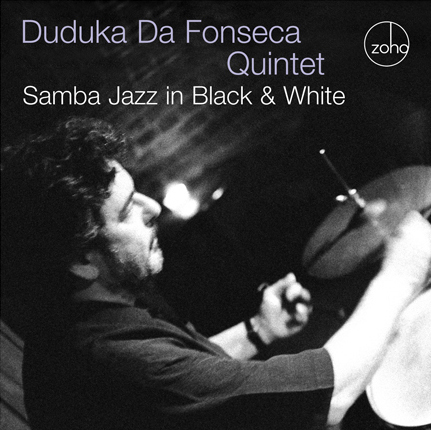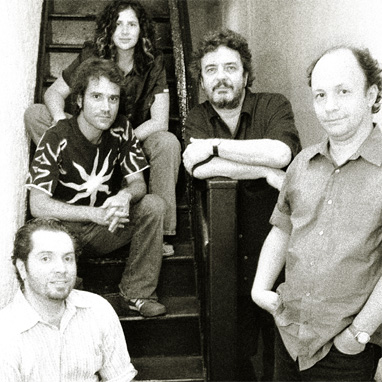|
The Duduka Da Fonseca Quintet
Samba Jazz in Black & White
With Maucha Adnet, Anat Cohen, Vic Juris
Release Date: March 14, 2006
Selection #: ZM 200603
Songs:
1. Mestre Bimba
2. Janeiro
3. Bye Bye Brasil
4. Chorinho Pra Ele
5. Viver De Amor
6. Medo De Amar
7. Palhaco
8. Terra de Angara - Intro
9. Terra de Angara
10. O Grande Amor
11. Sambetinho
12. Dry Land
|
Musicians:
Duduka Da Fonseca - drums, percussion
Helio Alves - piano
Anat Cohen - tenor & soprano saxes, clarinet
Guilherme Monteiro - electric and acoustic guitars
Leonardo Cioglia - bass
Special Guests:
Maucha Adnet - vocals
Alana Da Fonseca - vocals
Vic Juris - guitar
Paulo Levi - tenor sax, flute
Claudio Roditi - trumpet
Producer - Duduka Da Fonseca
|
 |
|
If you ever have a chance to hang out with Duduka Da Fonseca, you’ll have an idea why he’s one of the world’s great drummers, and one great human being beyond that. He has warmth, spirit, curiosity, vitality, sensitivity, he has joie de vivre. Samba Jazz in Black and White is Da Fonseca’s second solo project, a superlative follow-up to his 2002 Grammy-nominated Samba Jazz Fantasia (Malandro). The new CD focuses on the drummer’s quintet, with a handful of guests, among them Duduka’s wife of 18 years, the marvelous singer Maucha Adnet.
Da Fonseca’s goal is blending samba with jazz. “I’ve been developing that all my life,” he says. “That’s my work.” Duduka, born in Rio de Janeiro in 1951, was raised on music. “Since I was a kid, I was exposed to Nat King Cole, Gerry Mulligan, Sinatra, Jobim, Luis Bonfa,” he says, naming a handful. “It’s always been my dream to mix jazz with samba. Many people think that jazz has only been mixed with bossa nova. But while that was happening in Brazil, a lot of people were playing samba with a Blue Note vibe, like (trombonist) Raul de Souza, and drummers Edison Machado, Milton Banana, and Dom Um Romao, and pianists Dom Salvador and Tenorio, Jr.” And today, that special kind of music is played by Da Fonseca, a brilliant drummer who has had no formal musical training – “I learned in the streets, not bragging, but it’s important.”
As a teenager, Duduka hung out with de Souza, Machado and others, soaking up the jazz of Horace Silver, Miles Davis, and countless others. He and his bass-playing brother, Miguel, were part of a popular trio in Brazil. He moved to New York in 1975, where he’s led bands, and performed with such notables as Joe Henderson and Tom Harrell. He’s also appeared on over 200 CDs by Harrell, John Scofield, Mulligan, Claudio Roditi, Phil Woods, and many more. He formed the outstanding Brazilian jazz group Trio da Paz with guitarist Romero Lubambo and bassist Nilson Matta. He married Adnet, and together they have a daughter, Isabella, age 7.
Now comes Samba Jazz in Black and White. Duduka explains the title: “There are two meanings. One is having the music be simple and truthful. The other is that Samba Jazz is a blend of black African origins influenced by white European classical and popular music.” The drummer – who cites such favorite trapsmen as Edison Machado, Elvin Jones, Paul Motian, Tony Williams, Jack DeJohnette, Roy Haynes, and Art Blakey – talks about his colleagues:
Duduka’s been friends with Sao Paulo-born pianist Helio Alves for ages. “We have a lot in common, we work so much together. He’s a special piano player,” he says. Of the Brazilian bassist Leonardo Cioglia, a native of Brasilia who studied and taught at Berklee College of Music in Boston before moving to New York City a few years ago, Duduka states, “I really like his time, it feels very comfortable with him.”
Tenor and soprano saxophonist and clarinetist Anat Cohen hails from Tel Aviv, Israel, but plays like a Brazilian. “She studied with Leonardo at Berklee, and has been to Brazil several times, studying Brazilian music,” Duduka notes. “She really understands the rhythm, the syncopation. And she’s a very lyrical player.” Guitarist Guilherme Monteiro, who has recorded with singer Luciana Souza and tenorman Harry Allen, “really understands bebop, like Helio,” says Da Fonseca. “And he knows how to apply that when he mixes samba with jazz. That’s what I need in my group.”
The collection starts with the saucy Mestre Bimba by Luiz Eça, Bebeto, and Helcio Milito, for which Duduka devised the drum pattern. “It’s a mix of samba, afoxé, marcha, with maybe a little New Orleans touch in there,” as he puts it. “I came up with this rhythmic pattern 20 years ago, first time I’ve recorded it.” The song features wordless vocals on the theme by Maucha and Alana Da Fonseca, his daughter from a previous marriage. Alana is a music graduate of the State University of New York (SUNY) Purchase. She sang two songs in the recent Brad Pitt-Angelina Jolie film, ‘Mr. and Mrs. Smith’. “She’s super talented, and I’m really proud of her,” says her dad.
The subsequent Janeiro is by Ion Muniz, “an old friend of mine from childhood,” says the leader. “I’ve been playing this song, which I love, for over 30 years. It’s very groovy, the way things move around, a happy, high energy tune.”
The dulcet Bye Bye Brasil by Roberto Menescal and Chico Buarque, was a Brazilian hit in the ’80s. “It’s usually played with a fast beat, but I wanted to play it as a jazz ballad with my old friend, (trumpeter) Claudio Roditi,” says Duduka. “He’s been a great musical inspiration in my life, and otherwise. My brother-in-law, Chico Adnet, made a beautiful arrangement.” Hermeto Pascoal’s Chorinho Pra Ele spotlights the buoyant clarinet of Anat Cohen. “I used to play this in my New York Samba Band in the ’80s,” Da Fonseca states. “It’s a lovely but very difficult song, and Anat did a fantastic job.”
|
 The Duduka Da Fonseca Quintet. From left to right : Leonardo Cioglia, Guilherme Monteiro, Anat Cohen, Duduka Da Fonseca, Helio Alves. Photo by Tato Riquelme. The Duduka Da Fonseca Quintet. From left to right : Leonardo Cioglia, Guilherme Monteiro, Anat Cohen, Duduka Da Fonseca, Helio Alves. Photo by Tato Riquelme.
One of the most rhythmically compelling numbers is Toninho Horta’s Viver De Amor. A long-time favorite of Duduka’s, he played it with his band in the ’80s that featured Bob Mintzer and Randy Brecker, and now with his quintet. Guesting are tenorman Paulo Levi and guitarist Vic Juris. “They took memorable solos,” says Duduka. “I’m glad they were part of this project, because they often played with the quintet, filling in for Anat and Guilherme.”
The emotive Medo De Amar (“Afraid to Love”) by Vinicius De Moraes was arranged by Muniz. Maucha, who sang with Antonio Carlos Jobim for ten years, delivers the sublime vocal. It’s one of the few songs where De Moraes (known for his lyrics to such Jobim classics as “Girl From Ipanema” and “A Felicidade”) wrote both lyrics and music. “Ion wrote the arrangement that features Paulo on four flutes, and there’s a beautiful guitar solo,” notes Duduka. “Maucha sings with so much emotion, so heartfelt. I just love the way it comes out.”
Egberto Gismonti’s Palhaço showcases Cohen’s warm and moving soprano saxophone. “There’s a kind of gospel mood, and the lyrical melody is heartwarming,” says the leader, who next drops in a meaty solo to begin Haroldo Mauro Jr.’s Terra De Angara. “My old friend Haroldo composed this 40 years ago, when he was 16,” Da Fonseca states. “It was his first composition. He’s a great pianist and highly respected; I learned a lot from him. I used to play with him in the ‘60s, and I just recorded with him in Rio.”
Jobim is represented by O Grande Amor with Cohen’s evocative tenor sax. Duduka: “A Brazilian and jazz album without a Jobim song is not complete. I’ve been a fan of his since I was a kid and had the honor to play and record with him in Portugal in 1992. A DVD of that performance is scheduled to be released soon.” Sambetinho is by Alves, another of Duduka’s favorite composers. “I love the way he phrases the composition, which induces you to have a loose rhythmic approach,” he says. “It’s more in the air, it flows more, that’s what I love.”
The CD closes with Dry Land by Marcos Silva, a Rio-born pianist and composer who lives in the San Francisco Bay area. “We played together in New York in the late ‘70s,” says Da Fonseca. “I just love the groove of this tune, which is very Brazilian but goes to blues changes for the solos.”
Duduka is thrilled with Samba in Black and White. “The musicians were committed to the music, to the band, and they did a wonderful job. I’m proud and happy.”
Zan Stewart
Recorded at Acoustic Recording, Brooklyn, NY, September 26 – 28, 2005. Engineer: Michael Brorby. Mixed by James Farber. Mastering by Michael McDonald, Algorhythms, NYC. Producer : Duduka Da Fonseca. Photography : Tato Riquelme. Executive Producers : Roger Davidson and Joachim Becker, Becker Davidson Entertainment, L.L.C.
Arrangements of “Bye Bye Brazil”: Chico Adnet & Duduka Da Fonseca; “Medo de Amar”: Ion Muniz.
Duduka Da Fonseca uses Zildjian cymbals, Vic Firth sticks, brushes and mallets, and Sonor drums.
Duduka Da Fonseca bookings : DudukaDaFonseca@nyc.rr.com Tel 212 979 6027. www.dudukadafonseca.com
|
|
|
|

